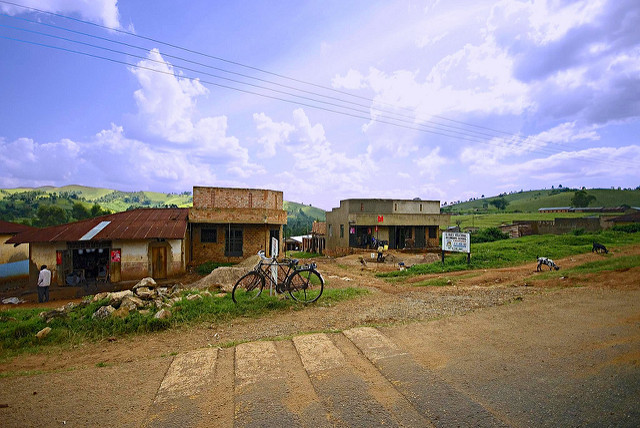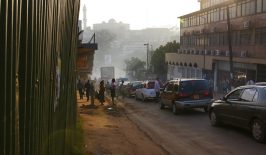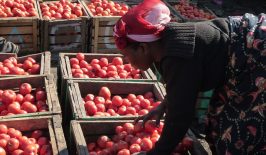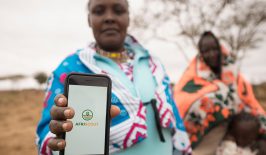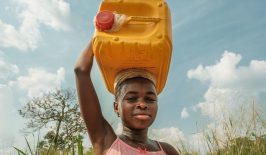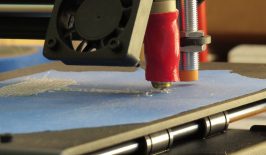Anyone visiting the Innovation Center in the Ntinda district of Kampala could easily mistake it for a co-working space in Berlin. Colourfully painted walls, a bicycle hanging up above the reception area, and, of course, the obligatory clusters of desks and chairs for people working remotely on all kinds of different projects.
Kamapala is Uganda’s startup hotspot and at the Innovation Center, that is clear to see. Many of the young companies based here work on Fintech projects, which have become more and more popular ever since the rise of mobile payments. The organisation ENVenture also works in the financial field, albeit in a slightly different way. RESET writer Jasmina Schmidt spoke with Julius Mujuni, Country Manager for Uganda at ENVenture, about the work they do to ensure that rural communities have access the latest clean energy technologies.
What does ENVenture do and how did you start?
ENVenture was started by Aneri Pradhan, who had previously worked for the UN Foundation and supported several energy companies in Uganda. During one of her visits to the villages of Uganda, she discovered that many people wanted products such as energy-saving stoves. There were also many local organisations in these communities that were interested in selling these products to the communities. The biggest difficulty that they had was that they lacked the funds. When it comes to energy, the problem in Uganda isn’t a lack of solutions – there are many solutions – the problem is a lack of access to those solutions. For example, solar powered devices: they are easily available in Kampala, but many people in the villages don’t have access to them.
Why is that?
Many of the companies that sell these products prefer to work in urban and suburban areas. If you look at the local economies, most villages are dependent on agriculture and are exposed to its seasonal challenges. So if you run a shop and sell products there, you will have about six months of very good income and six months of very low income from sales. And yet you have constant costs over the whole period: you have to pay the rent and your employees. Many companies are therefore afraid that it will not make economic sense to do business in remote areas. And yet in these villages we already have community-based organisations (CBOs) and many other potential partners who would be able to sell products like these.
How does ENVenture bring clean energy technologies to those underserved areas?
First ENVenture did research to gain an understanding of the challenges, and then we looked for organisations that were already deeply rooted in the communities and could sell these products. In the first three years, we were more of a pilot project until 2016 when we received support from DFID (Department for International Development) and Unilever. That enabled us to expand. We started with six CBOs and today we support over 80. Each CBO represents a shop that selling clean energy products in a very remote Ugandan village.
What kind of products do they sell?
We promote four types of products: solar powered devices, briquettes (that replace charcoal and firewood), stoves and non-electric water filters. Many people regard water filters as a WASH (Water, Sanitation and Hygiene) product because they clean water. From the ENVentures perspective, however, we see them as a clean energy product because people normally use firewood to make drinking water: They cut down a tree, take the firewood and boil water to purify it. So if they have a water filter, fewer trees will be cut down and burned. The filters consist of a clay pot with very small holes to clean the water.
Different communities have different needs, of course, so what we do is this: ENVenture provides the financing to the CBOs that own the shops. But before they receive the financing as a loan, they need to understand their market. Many of the people in the CBOs don’t have research skills and have never business before. That’s why we provide them with business fellows. They often come from Europe, the USA or Uganda. They are students who have just graduated or people with a business background. We send them to one of the CBOs for three months to support them in setting up the shop and conducting market research to find out which products the community needs. When they’ve gathered the information, the CBO then invests the money, starts selling and pays ENVenture the loan back within twelve months.
That’s an interesting approach. Often the problem with microfinancing is that people don’t know how to repay the loan and that leads to problems and starts a vicious cycle with more microcredits taken out to repay the old loan…
We try to find solutions for those challenges. Many of these people don’t know how to run a business, so if we just gave them the money, they might end up spending the money on the wrong things. We try to get them into the right mindset where they have a certain respect for money and can run a good business. Only then can we build truly sustainable energy systems. Unfortunately, most of the banks don’t make loans in that same way.
How do you choose which CBOs to work with?
There are so-called “NGO forums” at the municipal and district level. Most CBOs join the forums and that’s where we promote what ENVenture does. When the CBOs come to us, we have a list of things we expect from them. For example, they must have been around for more than five years. Many people ask us: Why don’t you just work with individual entrepreneurs to build up the businesses? We specifically target CBOs because they are unlikely to end up closing the shops. They have been in the communities for a long time and have done some kind of community work in the villages and are respected. Often people do not trust the products and therefore do not accept them. But the CBO has often already done very good work in the community, it has gained trust. So we have a long list of things that CBOs have to do. Do they have certain account books? Do they have a real team? How qualified is the team?
What has been ENVenture’s biggest success?
We have quite a few CBOs, maybe about ten, that are running very successful shops and that have exceeded the initial loan of 2000 USD. They managed to repay the whole loan, and then they came back to us and we provided them with more money from other donors. That’s one big success. Another is that some of the CBOs that we work with have been so successful that they have now started other projects with the proceeds from the energy shops. For example, there is one CBO called Initiative Uganda which now produces reusable sanitary towels. Conventional sanitary towels are very expensive here and many girls often have to miss school when they have their period, staying at home for five to six days before going back to school. This CBO makes reusable towels from very simple materials and they can be used over and over again.
Thanks for the interview, Julius!
FYI: To help the CBOs better manage their businesses, ENVenture has developed the ENVision app. Although mobile data is relatively cheap in Uganda when compared to other countries, it’s still prohibitively expensive for some groups of the population. For that reason, the app has been designed to work offline too. It helps users keep track of sales and inventory, manage customer payment installments and serve as a customer database. The app is designed to make it easier for CBOs, who usually have no business background, to keep track of their business. Other interested parties can keep track too, meaning ENVenture can also get a better overview of the impact that their financing is having.
